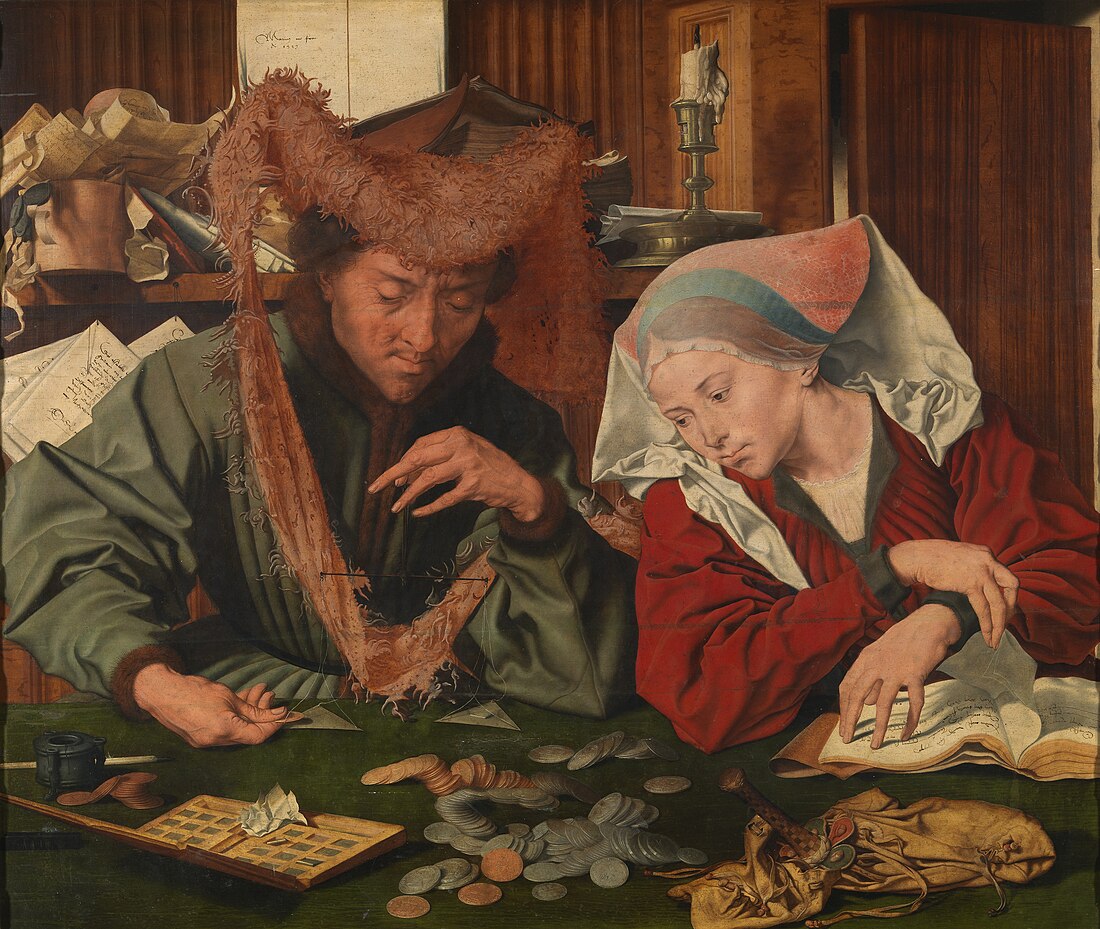Marinus van Reymerswaele
Dutch painter From Wikipedia, the free encyclopedia
Marinus van Reymerswaele or Marinus van Reymerswale [a] (c. 1490 – c. 1546) was a Dutch Renaissance painter mainly known for his genre scenes and religious compositions. After studying in Leuven and training and working as an artist in Antwerp, he returned later to work in his native Northern Netherlands.[1] He operated a large workshop which produced many versions of mainly four themes: the tax collectors, the money changer and his wife, the calling of Saint Matthew and St. Jerome in his study.[2]

Biography


Marinus van Reymerswaele was born in the city of Reimerswaal and he also derives his last name from this city. He was registered in February 1504 as a student at the University of Leuven. He was registered in 1509 in the Liggeren of the Antwerp Guild of Saint Luke as a pupil of Symon van Daele, a glass painter.[1]
He worked, at least from 1531 to 1540. In the latter year he moved to Goes, where he died around 1546.
Work
The artist is known for a small number of signed panels. A number of other paintings are attributed to Marinus on stylistic grounds. His works show the influence of the Antwerp painter Quentin Matsys.[2]
His oeuvre deals with of a relatively small numbers of themes, mostly adapted from Quentin Massys and Albrecht Dürer:
- The moneychanger and his wife
- Two tax collectors
- The lawyer’s office
- Saint Jerome in his study
- The calling of Matthew[2]

A large group of paintings of tax collectors are wrongly attributed to Marinus. His themes were popular in the sixteenth century and his paintings copied many times.
Madrid, the spanish capital concentrates the largest compendium of works by Marinus: the Prado Museum preserves four, the Thyssen-Bornemisza Museum, the Real Academia de Bellas Artes de San Fernando and the Monasterio de El Escorial (a permanent loan from the Prado) each own a piece. The Prado will open the first Marinus exhibition in 2021 .
List of works
- Antwerp, The Phoebus Foundation
- Two tax collectors
- Antwerp, Royal Museum of Fine Arts
- Saint Jerome in his study (1541)
- Two tax collectors
- Douai, Musee de la Chartreuse
- Saint Jerome in his study
- Dresden, Gemäldegalerie Alte Meister
- The moneychanger and his wife (1541)
- Florence, Bargello
- The moneychanger and his wife (1540)
- Ghent, Museum voor Schone Kunsten
- The Calling of Matthew
- Copenhagen, Statens Museum for Kunst
- The moneychanger and his wife (1540)
- London, National Gallery
- Two tax collectors (ca. 1540) attributed to the workshop by the Museum.
- Maastricht, Bonnefanten Museum
- Saint Jerome in his study (ca. 1541)
- Madrid, Museo del Prado[3]
- Saint Jerome (1521)
- The Virgin nursing the Child (1525-50)
- The moneychanger and his wife (1538) displayed permanently at the Royal Monastery of El Escorial[4]
- The moneychanger and his wife (1539)
- Saint Jerome in his study (1541)
- Madrid, Real Academia de Bellas Artes de San Fernando[5]
- St. Jerome in his cell (1535)
- Madrid, Museo Thyssen-Bornemisza[6]
- The Calling of St. Matthew (ca. 1530)
- München, Alte Pinakothek
- The lawyer’s office (1542)
- The moneychanger and his wife (1538)
- Naples, Palazzo Reale di Capodimonte
- "Two tax collectors"
- New Orleans, New Orleans Museum of Art
- The lawyer’s office (1543)
- Paris, Louvre
- Two tax collectors (ca. 1540)
- Saint Petersburg, Hermitage
- Two tax collectors
- Vienna, Kunsthistorisches Museum
- Saint Jerome in his study
- The Unjust Steward
- Private collections
- The Calling of Saint Matthew
- The Calling of Saint Matthew
Gallery
- Selected works
- The tax collectors (c. 1530-1535), Royal Museum of Fine Arts Antwerp
- The moneychanger and his wife (c. 1538), Musée des Beaux-Arts de Nantes
- Two tax collectors (c. 1540), National Gallery, London
- Saint Jerome in his study (1541), Royal Museum of Fine Arts Antwerp
Notes
References
External links
Wikiwand - on
Seamless Wikipedia browsing. On steroids.




